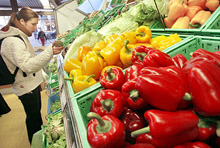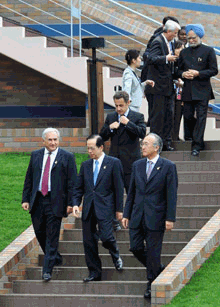
Typical street scene in Santa Ana, El Salvador. (Photo: iStock)
IMF Survey: Tackle Inflation Now, Strauss-Kahn Says at G8 Summit
July 9, 2008
- Concern that commodity hikes channeling into general inflation
- Risk that some central banks are falling "behind the curve"
- Credit conditions could tighten further
Inflation should be the top concern of policymakers confronted by higher food and fuel prices.

IMF's Managing Director called on G8 leaders to prevent higher food and fuel prices turning into generalized inflation (photo: Newscom)
G8 SUMMIT MEETING
This was the main message from Dominique Strauss-Kahn, Managing Director of the International Monetary Fund (IMF) to the leaders of the Group of Eight (G8) July 9 in Hokkaido, Japan.
"When you worry about high oil and food prices, you should be concerned about growth, but even more concerned about inflation," Strauss-Kahn said, calling on leaders to act to prevent higher food and fuel prices turning into generalized inflation.
Hitting global demand
Oil prices are likely to remain high and volatile for some time, because demand and supply react only slowly to higher prices, he said, adding that the 70 percent increase in oil prices since the beginning of the year is reducing purchasing power in importing countries and could lower global demand by ¾-1 percentage point.
Many advanced economies have taken appropriate monetary policy remedies to tackle higher-than-expected headline inflation. But in some emerging economies where real interest rates are low or negative, there is a risk that central banks are falling "behind the curve".

IMF's Dominique Strauss-Kahn (l) confers with Japanese Prime Minister Yasuo Fukuda ( c ), International Energy Agency Executive Director Nobuo Tanaka ( r ), with French President Nicolas Sarkozy following, at G8 summit (photo: Newscom)
"Headline inflation rates in many emerging economies are up by more than 5 percentage points this year. This is mostly because food and fuel have a high share in consumption baskets. But there are signs that rising food and energy prices are sparking more generalized inflation through second-round effects."
Strauss-Kahn was speaking after attending the final day of the three-day summit, along with the leaders of G8 countries Canada, France, Germany, Italy, Japan, Russia, the United Kingdom, and the United States. The European Union and fifteen developing and emerging market countries also were represented at the talks, which covered diverse topics including climate change, development and Africa, global food security, international institutions, and political issues.
Allowing the price increases in fuel and food products to be translated into a general increase in inflation would delay the supply and demand responses to high prices, undermine growth by raising inflationary expectations, and hurt the poor because they have the least capacity to hedge against inflation, according to Strauss-Kahn.
Fragile confidence in markets
Strauss-Kahn said financial markets remain under stress, adding, "Market confidence remains extremely fragile." Investors have been reassured by central bank actions to forestall systemic events, but the continuing need for banks to raise capital suggest that credit conditions could tighten still further.
"We recommend that authorities monitor financial sectors closely and be aware that budget support for troubled institutions or debtors might be needed."
During the release of an IMF analysis on the impact of high food and oil prices, Strauss-Kahn warned on July 1 that the surging commodities prices were driving some developing countries close to a tipping point [see related story].
Comments on this article should be sent to imfsurvey@imf.org


